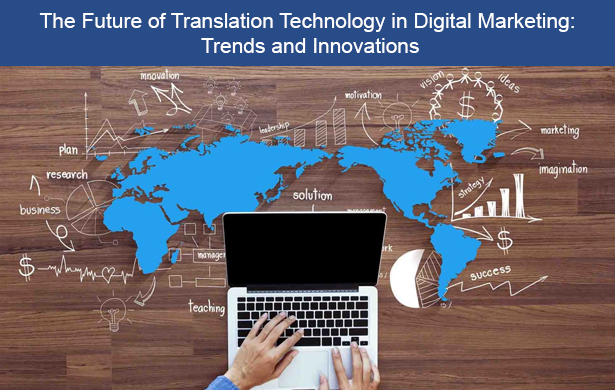
Digital marketing is no longer confined to local markets. With the rise of globalisation, businesses are expanding their reach to international audiences, presenting both opportunities and challenges. One of the key challenges to reaching global markets is overcoming language barriers. According to a survey, about 75% of customers prefer to buy from websites in their native language. Fortunately, advancements in digital marketing translation services are changing the way businesses engage with diverse audiences worldwide. In this blog, we will explore the emerging trends and innovations shaping the future of translation in digital marketing.
Translation technology has come a long way since its inception. Traditional methods of translation, such as manual translation by human translators, are being complemented by automated solutions powered by artificial intelligence (AI) and machine learning (ML). These technologies facilitate faster, more accurate, and cost-effective translation in digital marketing across multiple languages.
Machine translation, which uses algorithms to translate text from one language to another, has been around for decades. However, recent advancements in NMT have significantly improved the quality of automated translations. NMT models, inspired by the structure and function of the human brain, have a deeper understanding of language nuances and context, resulting in more natural-sounding translations.
NLP techniques play a crucial role in improving translation accuracy and relevance. NLP algorithms analyse the structure and semantics of the language, allowing translation systems to interpret and generate human-like text. Additionally, sentiment analysis algorithms can determine the emotional tone of content, helping marketers adapt their messaging to resonate with diverse cultural audiences.
As digital content becomes more diverse, including text, images, and videos, the demand for multimodal translation solutions continues to grow. Multimodal translation in digital marketing can translate not only text but also visual and audio content, ensuring a smooth and immersive experience for users across languages and cultures.
While translation focuses on converting content from one language to another,localisation goes a step further by adapting content to suit the cultural preferences and norms of target audiences. Localisation involves not only linguistic translation but also a cultural adaptation of images, colours, symbols, and even user interface elements. Digital marketing translation services use advanced localisation tools, such as AI and data analytics, to personalise content for specific markets, boosting user engagement and driving conversions.
User-generated content, such as product reviews, social media posts, and forum discussions, often requires translation in digital marketing to reach a global audience. Crowdsourcing platforms allow businesses to fund translations from native speakers or bilingual users, ensuring authenticity and cultural relevance. By utilising the collective intelligence of online communities, businesses can quickly translate user-generated content at scale.
To streamline translation in digital marketing process and manage multilingual content efficiently, integration with CMS is crucial. Translation management systems (TMS) are easily integrated with CMS platforms, allowing marketers to automate translation operations, track translation progress, and ensure language consistency across all digital channels.
Despite advances in AI-driven translation technology, human translators continue to remain indispensable for tasks that require cultural sensitivity, creativity, and subject matter expertise - all important for Digital marketing! Hybrid translation models, which combine the strengths of AI and human intelligence, are establishing themselves as the future of translation in digital marketing. Human translators can focus on high-value tasks such as transcreation, quality assurance, and linguistic validation, while AI handles routine tasks efficiently.
As translation in digital marketing becomes more prevalent, it is necessary to address ethical concerns and potential biases in automated translation. AI models trained on biassed or unrepresentative datasets may produce inaccurate or culturally insensitive translations. Developers and users must use bias elimination techniques, such as diverse training data and fairness testing, to ensure fair and inclusive translations.
The future of translation in digital marketing is bright, driven by innovations in AI, NLP, and multimodal translation. Businesses that adopt these advancements will gain a competitive edge in reaching diverse global audiences, driving engagement, and promoting cross-cultural connections. However, it's essential to strike a balance between automation and human expertise, using the strengths of both to deliver authentic, culturally relevant content that resonates with audiences worldwide.
Join hands with the best digital marketing translation services company: Language Services Bureau. Our skilled team ensures that contextual relevance is easily incorporated with accurate language translations. This results in improved brand consistency and the user experience for a wide range of audiences, enhancing your digital marketing efforts. Ready to drive engagement and generate leads across borders with the best digital marketing translation services company? Contact us today!
For any queries related to language translation services. Inquire at our email address below or give us a call today!
info@languageservicesbureau.com
Telephone: +91-20-24470509, +91-82370 60559
Similar articles for you...

आमच्या गेल्या महिन्यातील ब्लॉग मध्ये भाषांचे ज्ञान आवश्यक असणाऱ्या करियर क्षेत्रांची माहिती आपल्याला मिळाली. जिथे भाषेचे ज्ञान फायद्याचे ठरते असे इतर व्यवसाय आपण या महिन्यात पाहुयात.

Posted by : Language Services Bureau

The time it takes to learn a language depends on what you want to do with it– here is a great article about language learning and the kind of expectations you can set about the time required for the same!